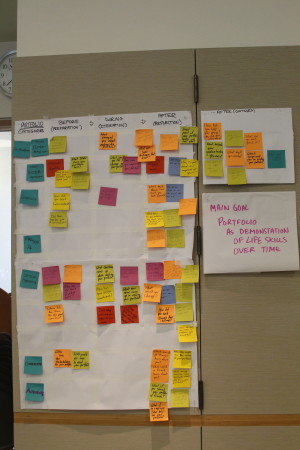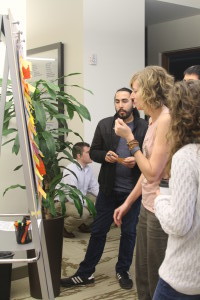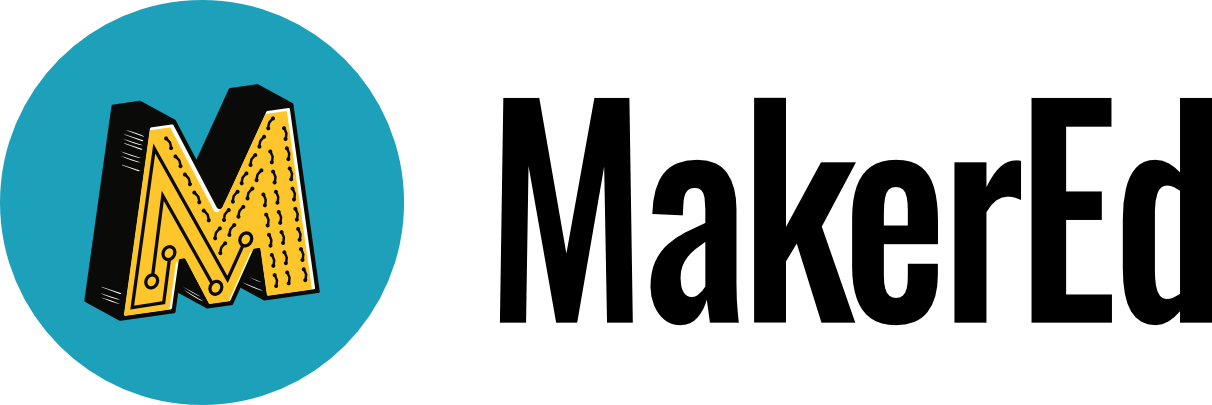In July and August 2015, we kicked off Phase 2 of the Open Portfolio Project. Having built a strong foundation of findings and insights from Phase 1, we are excited to continue deepening our work with the generous support of the Gordon and Betty Moore Foundation. In the months since, we have re-engaged with a few incredible field sites from Phase 1 and have explored new partnerships with other schools and out-of-school-time programs who are committed to developing their own portfolio practices — and therefore building our global understanding of how this is most effective!

As of late, portfolios have really become a prime topic of discussion too, whether as part of higher ed, industry, policy, or K-12 education. Especially as we’ve distilled and released our findings, more and more educators are wanting to know how they can get started — and contribute to the ongoing conversation. Because of this, Maker Ed is equally excited to work closely with practitioners in helping them to get started and develop their practices. In February 2016, Maker Ed designed, led, and implemented its first practitioner-facing workshop solely focused on portfolios. We welcomed over 50 educators and administrators (and had almost double the number of applications!) from all over the country, including new and veteran teachers working in all subject areas and grade levels, across independent, public, and charter schools, as well as museums, libraries, and other out-of-school-time programs.
 The Gordon and Betty Moore Foundation graciously hosted us during the 2-day workshop at their offices in Palo Alto, CA on Feb 17-18, 2016. We dove into all aspects and elements of portfolio creation and facilitation. The first day blasted off with opportunities forparticipants to jump into a maker project of their own, coupled with — of course! — documentation of their process and project portfolio creation. Groups developed intricate and impressive artifacts that showcased reflections of their own learning and work. These same experiences could be applied to the work and experiences that they design for their youth. Afternoon breakout sessions on the first day also allowed participants to take on a focused exploration of current platforms and tools. We played around with social media tools, well-known website creation platforms, and other portfolio tools, whether paid or free. The session revealed a wealth of elements that were important to educators, as they considered the needs of their classrooms and students.
The Gordon and Betty Moore Foundation graciously hosted us during the 2-day workshop at their offices in Palo Alto, CA on Feb 17-18, 2016. We dove into all aspects and elements of portfolio creation and facilitation. The first day blasted off with opportunities forparticipants to jump into a maker project of their own, coupled with — of course! — documentation of their process and project portfolio creation. Groups developed intricate and impressive artifacts that showcased reflections of their own learning and work. These same experiences could be applied to the work and experiences that they design for their youth. Afternoon breakout sessions on the first day also allowed participants to take on a focused exploration of current platforms and tools. We played around with social media tools, well-known website creation platforms, and other portfolio tools, whether paid or free. The session revealed a wealth of elements that were important to educators, as they considered the needs of their classrooms and students.
That day’s concluding session, which was on reviewing and discussing real example portfolios from youth, sparked lively debate on the quality, type, and content of portfolios. These conversations led directly into Day 2, which began with participant-generated key takeaways from the session of Day 1. These helped to frame the work for the second day, in helping participants think about the frameworks, language, and facilitation ideas for starting and integrating portfolios into their classrooms and educational environments. The final session focused on concrete next steps for each individual and institution.
 The workshop concluded with a unique afternoon opportunity, where participating educators and our National Working Group members were able to come together and discuss both the nitty-gritty of portfolios and their impact, as well as the big-picture research, questions, and ramifications of the work. Our National Working Group members had an opportunity to learn more about the on-the-ground complexities of portfolios too. The linking of research and practice set the stage for vibrant dialogue that we hope will continue far and wide!
The workshop concluded with a unique afternoon opportunity, where participating educators and our National Working Group members were able to come together and discuss both the nitty-gritty of portfolios and their impact, as well as the big-picture research, questions, and ramifications of the work. Our National Working Group members had an opportunity to learn more about the on-the-ground complexities of portfolios too. The linking of research and practice set the stage for vibrant dialogue that we hope will continue far and wide!
Overall, it was such a wonderful opportunity for us to host the workshop. Interspersed amidst all the serious moments of work were lots of fun and games too. Ask us about the incredible rock/paper/scissors matchup! We are thrilled to continue leading this work and invite more and more educators to join the conversation. To learn more, visit makered.org/opp. Stay tuned for the Practical Guide to Open Portfolios in the summertime of 2016!
And for more information on the workshop, check out our Storify below!
